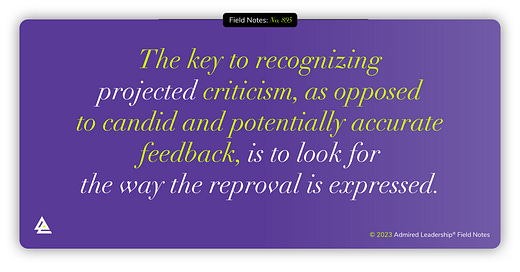People with deep insecurities have a peculiar habit. They commonly project those insecurities onto others. In other words, whatever flaw they struggle with is often the focus of their behavior with others.
For instance, leaders who ridicule others about their lack of confidence often struggle with their own self-confidence. Similarly, colleagues who struggle with holding themselves accountable often blame others for their lack of responsibility. Psychologists call this projection.
Any time a person shifts the focus from their own shortcomings onto others, they are said to be projecting. While everyone projects now and again, people (especially leaders) with deep insecurities do so frequently, creating misinformation disguised as feedback.
By attributing their own flaws to others, they avoid having to examine and deal with those deficiencies. This is a game that undermines the integrity of the feedback and criticism colleagues receive. Only rarely does a team member have the same weaknesses as the leader.
When viewed objectively, the ability of people to project significant weaknesses can be highly alarmingly. Consider a team member who does not have a committed work ethic but accuses others of not working hard enough. Or a leader who is wrestling with the urge to engage in an unethical shortcut who comes to believe others are acting unethically. Or a selfish and self-absorbed colleague who is suspicious of everyone else’s intent and self-interest.
Knowing when others are projecting enables us to distinguish between important feedback and nonsense. The key to recognizing projected criticism, as opposed to candid and potentially accurate feedback, is to look for the way the reproval is expressed.
Projected feedback is most typically an accusation. In contrast to constructive criticism, projected feedback is usually expressed in a disparaging way that fully denounces people or actions. When the strength of any criticism is wildly out of proportion, projection is likely the reason.
Another sign of projection is an unexplainable or irrational reaction. When a leader or colleague has an exceptionally strong reaction to something you say or do that has no basis or reasonable explanation, they are likely projecting their insecurities onto you.
To improve and grow, feedback from leaders and colleagues is essential information. People don’t develop without critical feedback. But knowing what criticism to ignore or discard is also crucial.
Projected feedback is rarely accurate and needs to be taken for what it is. Displacing one’s feelings onto another person is something we all do at times. But when it serves as the basis for feedback, it deserves to be cast aside.





This is a serious problem! Just recently h had a conversation with a team member that is a pro at this. In one breath they say they are annoyed because other people are late or drop the ball all the time while they have to be present and has to deal with everyone’s insufficiency. The next day...they showed up late, and they didn’t realize they were behind one day for a deadline everyone else had already completed. Wow.
As I’m reading the comments I also resonate deeply with @davidcmorris. To have to begin every conversation with a topic of interest with this person is in redoble frustrating considering. We’ve worked together for three years. When is it enough? It seems people struggle to have a sense of the. If picture. I suppose I view it as, we’ve been here for three years doing great together, by now everyone’s intent and work ethic should be figured out.
Great post!
Re: I have worked under three Leaders in past companies who fit this bill. Specifically around - ...or a selfish and self-absorbed colleague who is suspicious of everyone else’s intent and self-interest.
No matter what I did, it wasn't good enough. If I had a good idea or did good work, they'd cut it or me down in front of the team. Funny thing, two of the three leaders were extremely intelligent - smarter than me. Just very insecure. They built up their identities as being the smartest kid/adult in the room. Too smart to fail. When they weren't, it rocked them at their core.
I struggled working with these leaders because it isn't my style to sit back, remain silent, and take it. The only successful strategy I was able to deploy was to find something they were interested in or passionate about and get them talking about it and themselves whenever possible. One leader did day trading on the side (actually, I think he did this all day during work). I asked him to teach me how he set-up his Excel Spreadsheets to manage/wrangle data. I borrowed and read books he had on investing - put and call options. Another leader had recently lost over 100 pounds and had a 15K steps daily goal. I'd stop by her office during the day to see how she was doing (we worked at a manufacturing plant, so we did a lot of walking - even for HR folks). If she was low, I knew that stressed her out and I'd ask her if she'd want to go for a walk during our 1:1's.
I think I was semi-successful with these strategies, but it felt like I was just plugging my fingers into holes to stop the water in a leaky dam waiting and for the inevitable. Do you have or can you provide strategies that one can use when dealing with these kind of leader behaviors?